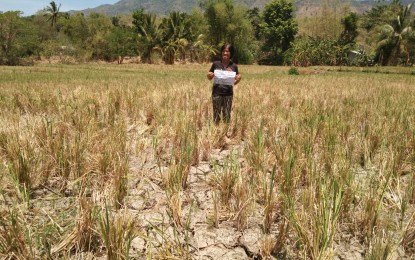
STATE OF CALAMITY. Three local government units in Negros Oriental have so far declared a state of calamity due to the El Niño-induced drought that has destroyed crops and other agricultural produce. The local governments are Bayawan City, Santa Catalina, and Mabinay. (PNA file photo courtesy of Mabinay LGU via DA-PATCO)
DUMAGUETE CITY – At least three local government units (LGUs) in Negros Oriental have already declared a state of calamity due to agricultural losses and damages induced by the El Niño phenomenon.
In an interview Tuesday, Adrian Sedillo, executive director of the Provincial Disaster Risk Reduction and Management Office (PDRRMO), identified the affected LGUs as those of Bayawan City, Sta. Catalina, and Mabinay.
Mabinay town was the latest LGU to make the declaration on Tuesday, while the two other LGUs placed their areas under a state of calamity over the weekend.
“Following the declaration of a state of calamity by the three LGUs, the provincial government can now also do the same for the entire province of Negros Oriental based on existing guidelines,” Sedillo said.
He added that the National Disaster Risk Reduction and Management Council (NDRRMC) Memorandum No. 60 Series of 2019 stipulates that when two or more LGUs are affected by a disaster, the provincial board could declare a state of calamity.
The PDRRM Council, chaired by Governor Manuel Sagarbarria, has already recommended to the Sangguniang Panlalawigan to declare Negros Oriental province under a state of calamity.
Sedillo said the move will allow LGUs and the provincial government to use their Quick Response Fund to cushion the negative impacts of the El Niño-triggered drought.
Sagarbarria noted that the province has not recorded any health incident related to El Niño so far.
As of April 18, the Department of Agriculture-Provincial Agriculture Technology Coordinating Office (DA-PATCO) reported that agricultural production loss had reached PHP 229.881 million.
The damage crops include rice, corn, high-value crops, livestock, and fisheries. (PNA)
